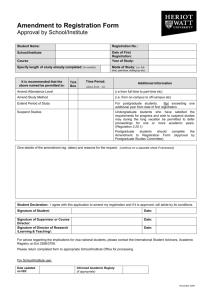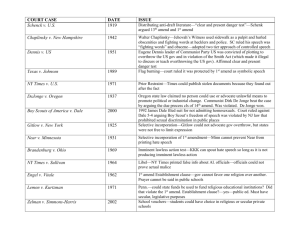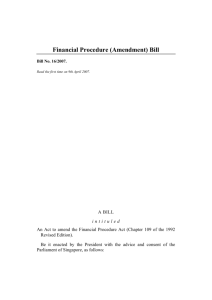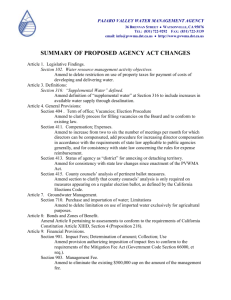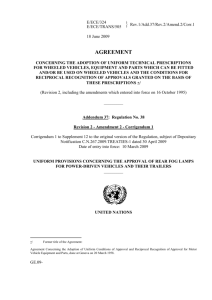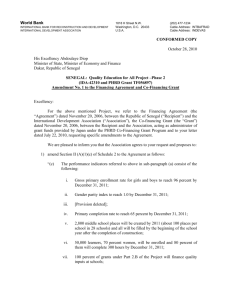Civil Liberties / Privacy
advertisement
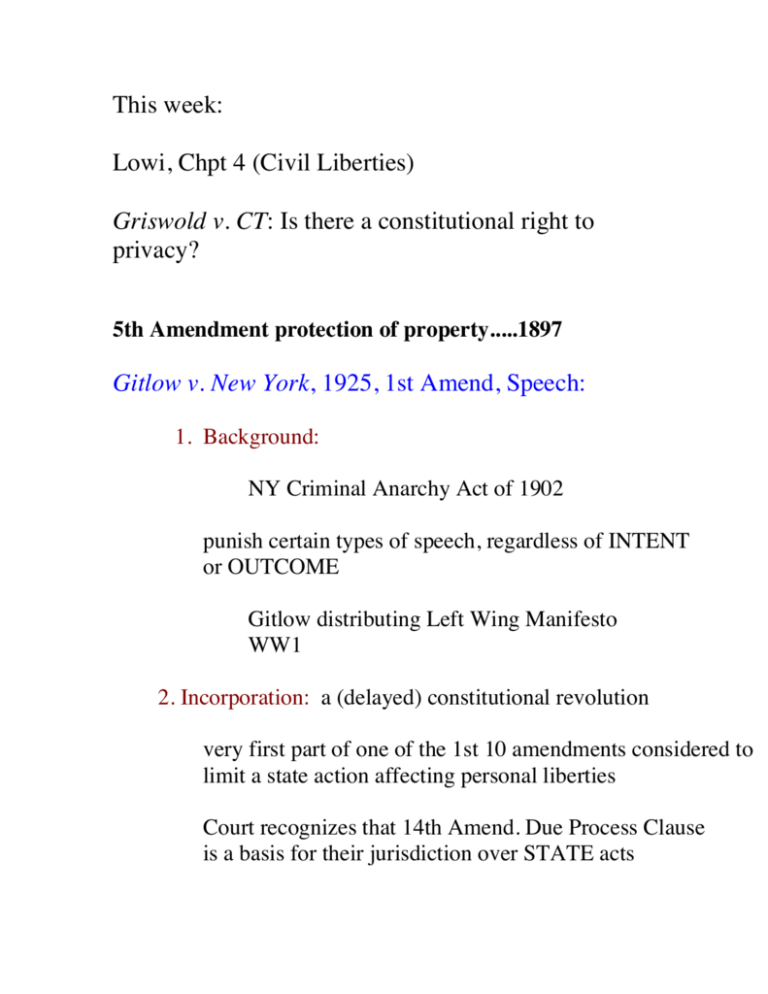
This week: Lowi, Chpt 4 (Civil Liberties) Griswold v. CT: Is there a constitutional right to privacy? 5th Amendment protection of property.....1897 Gitlow v. New York, 1925, 1st Amend, Speech: 1. Background: NY Criminal Anarchy Act of 1902 punish certain types of speech, regardless of INTENT or OUTCOME Gitlow distributing Left Wing Manifesto WW1 2. Incorporation: a (delayed) constitutional revolution very first part of one of the 1st 10 amendments considered to limit a state action affecting personal liberties Court recognizes that 14th Amend. Due Process Clause is a basis for their jurisdiction over STATE acts assume that speech is one of the fundamental privileges and immunities that ALL CITIZENS (US citizens) share 1st amend "among the fundamental liberties protected by the due process clause of the 14th amend" 3. Decision: Some speech protected from state acts via Bill of Rights reversing Barron v Baltimore (1833) BUT, previous Supreme Court decisions defined what speech is not protected, this was not Gitlow back to jail, since this type of speech not protected 1925: NY has legitimate interest in regulating speech if words used in such circumstances and are of such a nature to create a clear and present danger they will bring about a substantive evil (i.e., socialism) (Holmes, in Schenk v US, 1919) (Debs v. US 1919) Sedition Act of 1918 Fed. crime of "uttering words that incite resistance... or bring contempt to US govt, constitution, flag, uniforms..." Near v. MN (1931), 1st Amend, press 1. Free Press Jay Near, publisher of paper in MN attacks MN govt. jailed under MN law 2. Court: 14th Amend due process clause... prior censorship not accepted by ANY level of govt. Near gets out Rights of Accused Criminals (SLOW...) most criminal case done in state courts crim. procedure thus domain of state laws Quest: what are fundamental (national) rights that accused criminals have? 4th Amend - Search & seizure 1. Wolf v. Colorado, 1949 Court rules 4th amend prohibits states from unreasonable search.... "security of one's privacy against the arbitrary intrusion by the police, which is the core of the 4th amendment, is basic to a free society." "It is therefore implicit in the concept of ordered liberty....and enforceable against the states through the due process clause of the 14th Amend." BUT...what evidence can/cannot be used unanswered no application of federal standards of evidence... 4th Amend - Search & seizure 2. Mapp v. Ohio, 1961 Dollree Mapp, though to have drugs police have warrant to search home for drugs find pornography, convict her of possession Court: goes beyond Wolf v. Colorado no evidence can be used in STATE case that was obtained illegally STATE laws of admissible evidence overturned FEDERAL law already forbid such evidence in federal trials (Weeks vs. US, 1914) Don King??? 2014: What about your phone? 6th Amend., Right to Counsel 1. Betts v Brady, 1942 Betts indicted for robbery in MD asked for attorney (a non capital case) convicted argued 6th Amend = right to fair trial = right to assistance of counsel for his defense Brady MD AG (?) Court: no, not in non-capital state cases decision on process up to individual states 6th Amend., Right to Counsel 2. Gideon v. Wainwright (1963) 6th Amend right to counsel incorporated Similar to Betts case, different justices reversed Betts Incorporation of Bill of Rights 14th Amendment -> liberties, due process -> protections from State acts • How far do protections extend? • Found in what language in Constitution? E. 1964-1969, The Warren Court... 7 major decisions on 4th, 5th, 6th amendments overturning state criminal procedure rules 5th Amend, self incrimination (Malloy, 1964) and: 1. Miranda v. Arizona 1966, 5th Amend... consider context: until 1936 police could use beatings to get confessions....did this end w/ 1936 court decisions post 1936, "mental beatings" of accused... Miranda's case, "mentally disturbed" w/ 9th grade educ. accused of kidnap and rape victim ID Miranda in line up questioned for 2 hours, then admits guilt • never told he could refuse to answer questions • never told he could have an attorney present Court: no STATE or fed. conviction if evidence obtained by officers who failed to inform accused has a right to NOT incriminate himself must protect ALL accused because police have huge advantages Miranda stabbed to death in 1976.... The Warren Court Escobedo v. Illinois (1964) Expanded 5th & 6th amendment rights o arrested, asked to speak w/ atty, denied o atty tried to contact him, was denied o confessed w/o access to atty "the investigation is no longer a general inquiry..when suspect taken into police custody...[since police illicit incriminating statements]" must have attny present in questioning/interrogation also, other 6th & 7th amend rights "incorporated": • • • • confronting witness (Pointer, 1965) impartial trial (1966) speedy trial (1967) trial by jury (1968) Burger Court (1969-86), Rehnquist Court (1986-2005)... limiting rights of accused questioning Warren Court decisions Recent Decisions: Rights of Accused Where can you expect your 4th Amend right to privacy? "the right of people to be secure in their persons, houses, papers, and effects, against unreasonable searches and seizures shall not be violated..." 1. Burger Court (1969-86), Rehnquist Court (1986 - 2005) limiting "incorporated" rights of accused questioning Warren Court decisions "good faith clause" "overriding considerations of public safety" may justify interference w/ 4th Amend protections "War on Drugs" Terrorism 2. Rehnquist Court Minnesota v. Carter, 1998 Carter arrested after seen through window bagging cocaine o In another person's apartment o visiting o not over-night guests Argued use of evidence violated 4th Amend. Convicted in MN state court State court held that window observation NOT a search MN appeals court ruled drug business waived 4th amend protections MN Supreme Court reversed: "the defendants had a legitimate expectation of privacy in the invaded place and that the officer's observation constituted an unreasonable search" Question to US SC: Do household visitors have the same protection against unreasonable searches and seizures as do residents or overnight social guests? NO: defendant must demonstrate that he personally has an expectation of privacy in the place searched, and that his expectation is reasonable Where can you expect your 4th Amend right to privacy? "the right of people to be secure in their persons, houses, papers, and effects, against unreasonable searches and seizures shall not be violated..." Prior to arrest: • • • • • • • Does it extend to your car? (sort of, but less than before) Does it protect passengers in your car? (not much) Does it extend to your luggage in transit (no, not much) Does it extend to "guests" in your house? (yes, sort of) Does it extend to visitors to your house? (no) Does it prevent police from looking through your window? Does it prevent surgery to remove evidence (yes) • Does it prevent breath tests (no) • Does it prevent photos of your yard from sky (no) If no warrant: stop and frisk if “reasonable suspicion” (not probable cause) if consent given. by whom, your roommate? (yes) what can be "searched" after arrest o you, under your clothing o things in plain view o things and places under your immediate control (room, not house, parked car?) 3. Roberts Court (2005- today) Selective Incorporation, Conclusion Palko v. CT (1937), an example of slow process.... • • • • • • • • • Palko killed two police officers charged w/ 1st degree murder Palko convicted of murder, 2nd degree CT law allowed state to appeal for 2nd trial CT appealed Palko re-tried. Convicted of 1st degree murder Palko appeals to USSC, saying 14th Amd -> 5th Amd 5th Amendment, Double Jeopardy Court: NO. Some protections found in Bill of Rights are absorbed into the concept of Due Process (via 14th Amend) only because they are so fundamental to our notions of liberty and justice that they can't be denied by the states w/o compelling state interest (to ltd liberty). "Selective incorporation" = Court slowly answering questions about which rights are so fundamental that NO STATE shall deny Palko decision (1939) not over ruled until 1969. What Rights Not Incorporated?: 2nd Amendment Right to Bear Arms (2010) 3rd Amendment Protection Against Quartering 5th Amendment Right to Grand Jury Indictment 7th Amendment Right to Civil Jury Trial 8th Amendment Protection Against Excess fines/bail Privacy? (Friday discussion)
